Reduce Waste During the Holidays
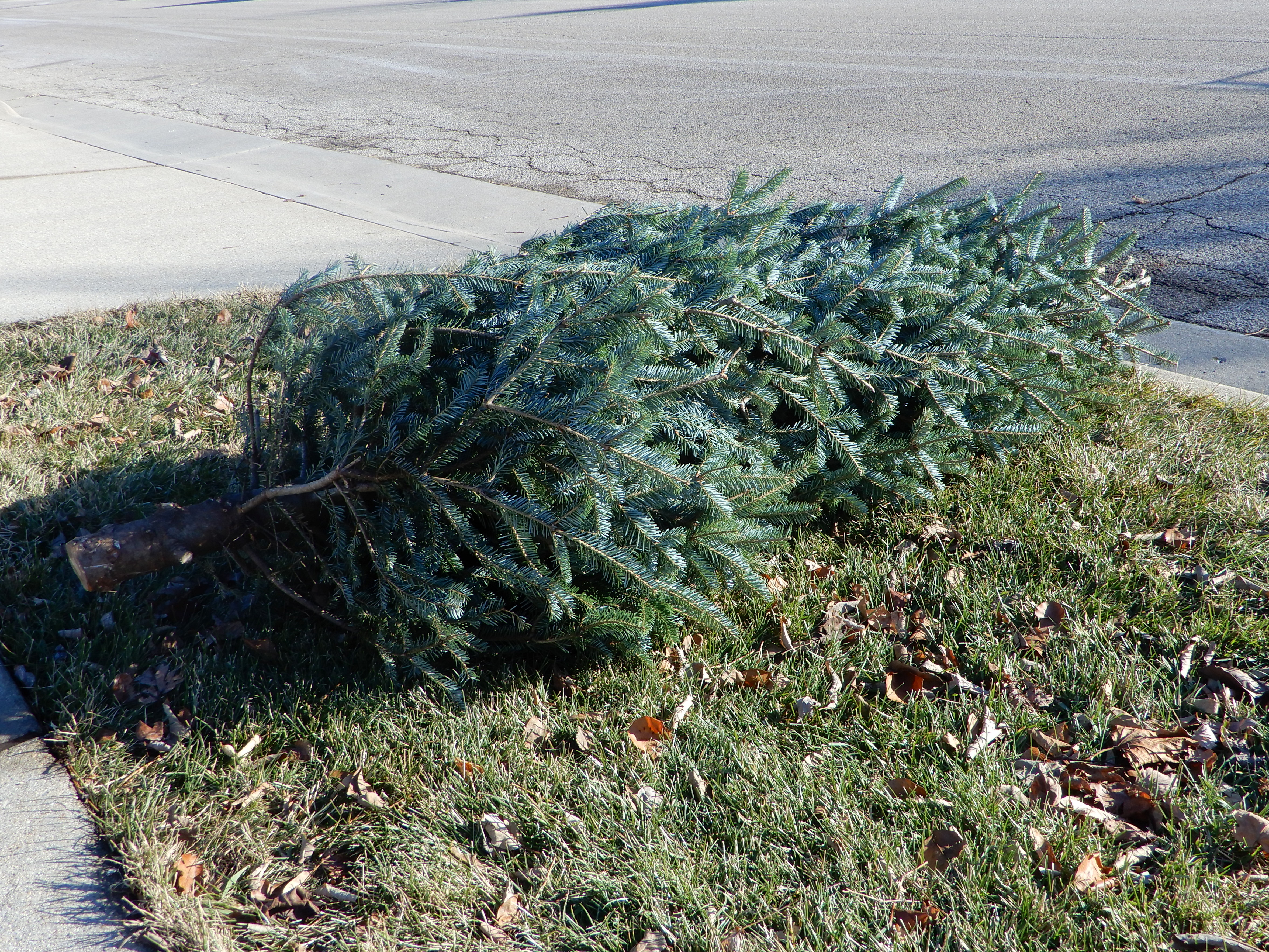 This magical time of year brings joy, warmth, and family fun, but it can be overwhelming at times, too. To reduce the stress of the holidays, we often select the convenience of disposable items, which leads to us generating almost 50% more trash in December.
This magical time of year brings joy, warmth, and family fun, but it can be overwhelming at times, too. To reduce the stress of the holidays, we often select the convenience of disposable items, which leads to us generating almost 50% more trash in December.
However, reducing your holiday waste might save you money and make your events more memorable, all while helping preserve our environment. Here are some quick tips for making less waste during the holidays.
Gift delicious experiences: Instead of buying cheap goods online, you can delight your loved ones with unique experiences such as taking them out to a new restaurant, gifting them a painting or cooking class, or offering to sponsor part of a trip.
Shop used: When selecting gifts, remember that nearly everything you’d like to get someone can be purchased secondhand or pre-owned – even online and on the biggest retail websites. Doing this reduces the environmental burden and creates opportunities for buying less mass-produced and often higher-quality items.
Opt for durables: If you’re hosting a holiday party, use real plates and cutlery to make your guests feel more at home. After the meal, the more guests you have, the more helping hands there are to wash dishes, and everyone wants to feel useful!
Reducing waste by embracing thoughtful gifts and your thriving community will help you truly make it the most wonderful time of the year. Follow @ZeroWasteGNV on Facebook and Instagram for more holiday waste reduction tips.
Worming Your Way to a Greener World: An Introduction to Vermicomposting
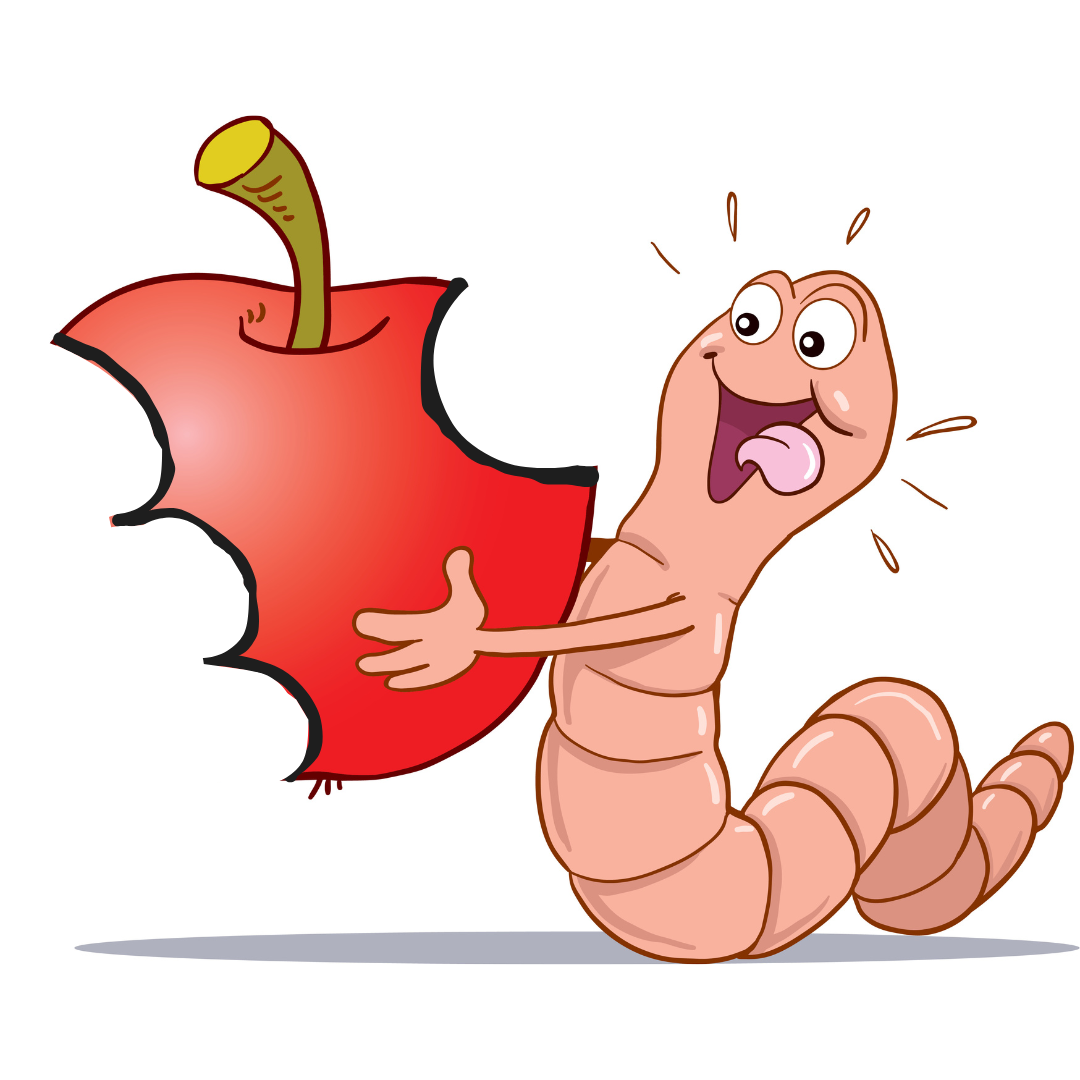 What if we told you that some of the smallest creatures on Earth play an important role in saving it? Meet vermicomposting. Vermicomposting is the process of using worms to turn your food scraps into nutrient-rich compost. Worms are tiny composting champions that reduce waste and help nourish the soil, making it healthier and more productive. Let’s dig in and discover how worm composting works and why it’s a fantastic way to shrink your environmental footprint!
What if we told you that some of the smallest creatures on Earth play an important role in saving it? Meet vermicomposting. Vermicomposting is the process of using worms to turn your food scraps into nutrient-rich compost. Worms are tiny composting champions that reduce waste and help nourish the soil, making it healthier and more productive. Let’s dig in and discover how worm composting works and why it’s a fantastic way to shrink your environmental footprint!
Vermicomposting involves using specific worms, typically red wigglers (Eisenia fetida), to break down organic waste like fruit peels, vegetable scraps, and even coffee grounds. The worms digest this material and excrete “castings” – a fancy word for worm poop – which are loaded with nutrients that plants love.
The process is simple:
1. Set up a worm bin – a container with proper ventilation, bedding (shredded newspaper or coconut coir), and a dark, moist environment.
2. Add your worms – red wigglers are the best for the job.
3. Feed them kitchen scraps – but avoid meat, dairy, and oily foods. And avoid overfeeding.
4. Harvest the castings – after a few weeks, you’ll have dark, crumbly “black gold” to use in your garden.
The environmental benefits of vermicomposting include reducing material needlessly sent to the landfill, creating a natural fertilizer for your plants, supporting soil biodiversity, and making a host of tiny, fascinating, and, most importantly, hungry worm friends.
Learn more about worming your way to a greener world at gainesvillefl.gov/Recycle and @ZeroWasteGNV on Facebook and Instagram.
Surprisingly Common Items That Are Not Recyclable
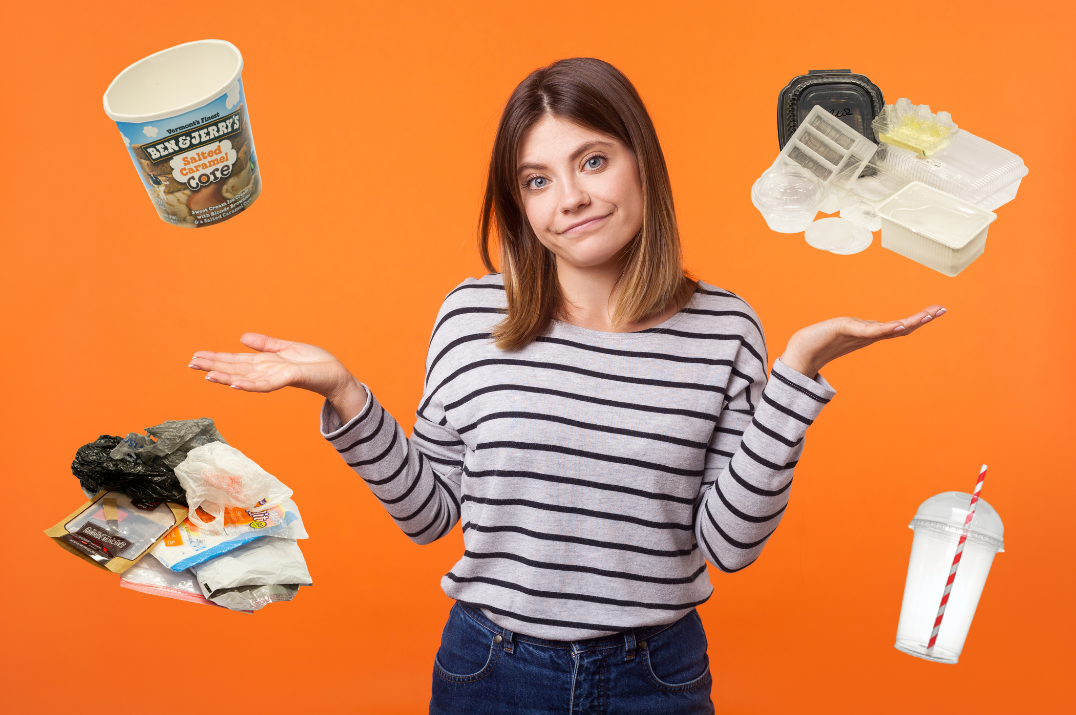 Confusion about what can and can’t be recycled is widespread, and with recycling rules varying from one place to another, it doesn’t make it any easier. However, keeping non-recyclable materials out of recycling bins is crucial to reducing processing costs and maintaining strong market demand for recycled materials.
Confusion about what can and can’t be recycled is widespread, and with recycling rules varying from one place to another, it doesn’t make it any easier. However, keeping non-recyclable materials out of recycling bins is crucial to reducing processing costs and maintaining strong market demand for recycled materials.
Here are seven items that most recycling programs do not accept:
1. Store receipts – Most receipts are printed on thermal paper coated with chemicals that make them unsuitable for recycling.
2. Plastic single-use cups – Don't be misled by the recycling arrows; these cups are made from lower-grade plastic, which is not widely recyclable.
3. Ceramic bottles & jars – Common in high-end beauty products, these items differ from glass beverage containers and can contaminate recycling streams.
4. Paper coffee cups – The plastic lining that keeps these cups waterproof also makes them non-recyclable. However, the cardboard sleeves are usually recyclable.
5. Plastic straws & utensils – Most straws, forks, spoons, and knives are usually made from non-recyclable plastics and are too small to be processed effectively.
6. Pizza boxes – The greasy, oil-soaked bottoms of pizza boxes can’t be recycled. However, the clean tops can be torn off and recycled.
7. Insulating liners – Often used in meal kit deliveries, these liners can tangle in sorting machinery and should not be placed in recycle bins.
To find out what items are recyclable locally, visit the Zero Waste Wizard at gainesvillefl.gov/WasteWizard, and be sure to follow @ZeroWasteGNV on Facebook and Instagram.
Zero Waste & You: Reducing Waste at the Office
 Having a Zero Waste plan at the office is an impactful way to reduce environmental footprints, foster team engagement, and improve workplace sustainability. By implementing small yet effective changes in how we recycle and reduce waste, we can help create a cleaner, greener workplace.
Having a Zero Waste plan at the office is an impactful way to reduce environmental footprints, foster team engagement, and improve workplace sustainability. By implementing small yet effective changes in how we recycle and reduce waste, we can help create a cleaner, greener workplace.
1. Form an office “Green Team” with employees from all workplace sectors.
- Obtain support from management and custodial staff.
- Appoint an enthusiastic and dependable recycling coordinator.
- Determine what materials are going to be recycled.
- Select a certified hauler for the collection and transportation of recyclables.
- Promote the program with an official kick-off ceremony or memo from management.
2. Set up Effective Waste Stations.
- Strategically place recycle containers in locations where the waste is generated (i.e., copier rooms) and always try to pair a recycle container next to a trash container.
- Ensure recycle containers are distinctively, adequately labeled, and serviced regularly.
- Educate staff on what can (and can’t) be recycled with posters, memos, and emails.
3. Starting Reducing Waste.
- Go Digital: Shift to digital documents and cloud storage to minimize paper usage.
- Set double-sided printing as the default on copy machines.
- Invest in refillable items like pens and soap dispensers.
- Provide employees with reusable water bottles, coffee cups, and food containers.
- Stock kitchen areas with reusable cutlery, plates, and glasses.
4. Minimize Food Waste
- Set up a compost bin for food scraps and partner with compost services to turn food waste into soil-enriching compost.
- Encourage mindful ordering by not over-ordering catering for events and ask caterers for eco-friendly packaging options.
For assistance setting up your workplace zero waste program, contact the City of Gainesville Solid Waste Division at waste@cityofgainesville.org or 352-334-2330.
Don’t Toss Out Those Old Holiday Lights – Recycle Them Instead!
 As the festive season draws near, many of us eagerly unpack boxes of holiday decorations, including strings of twinkling lights that have adorned our homes for years. But what if you find a set that’s no longer working or impossibly tangled? Don’t throw them away—recycle them!
As the festive season draws near, many of us eagerly unpack boxes of holiday decorations, including strings of twinkling lights that have adorned our homes for years. But what if you find a set that’s no longer working or impossibly tangled? Don’t throw them away—recycle them!
Residents can drop off old holiday lights for recycling at the City of Gainesville's Public Works offices at 405 NW 39th Avenue, through the end of January. Accepted items include strings of incandescent lights, LED lights, “icicle” lights, light wires, and attached bulbs. Please remove light casings, such as plastic candy cane shells, before bringing them in for recycling. No set of lights is too tangled for recycling!
Residents may also recycle old holiday lights year-round at any one of the Alachua County Drop-Off sites. For a complete list of drop-off locations, visit gainesvillefl.gov/WasteWizard.
Switching from old incandescent lights to new LED lights can lead to big savings on your electric bill. LED lights consume 80-90% less energy than traditional incandescent bulbs and can last up to 100,000 hours, compared to only 3,000 hours for incandescent lights.
And remember NOT to place holiday lights in your home recycle bins.
5 Ways to Reduce Food Waste This Thanksgiving
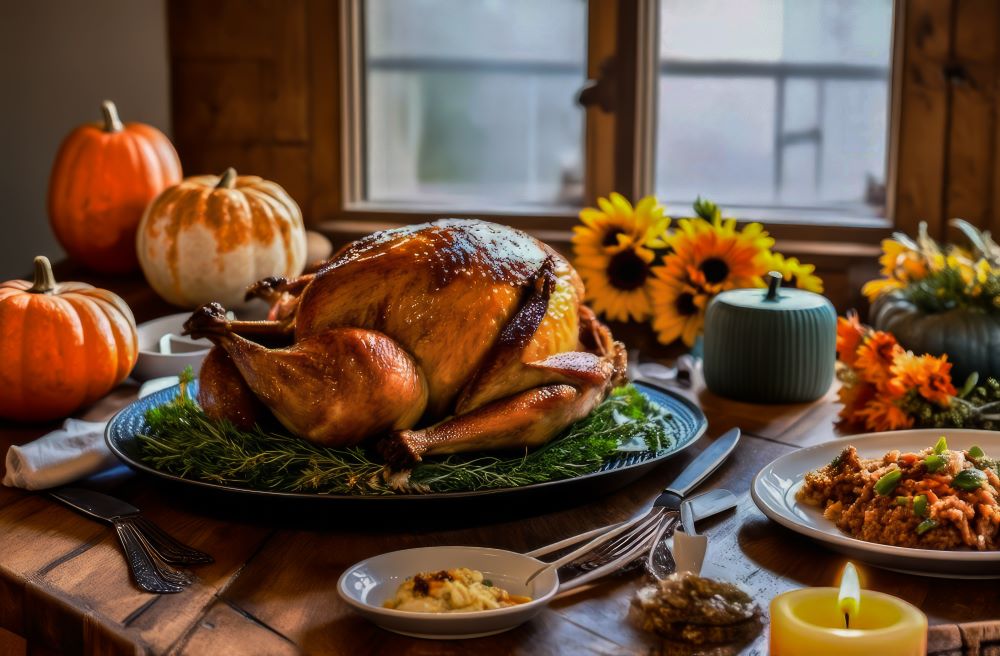 Thanksgiving is all about gathering with loved ones, sharing gratitude, and, of course, enjoying a delicious feast. But with all the hearty portions and abundant side dishes, food waste often becomes an unfortunate part of the celebration.
Thanksgiving is all about gathering with loved ones, sharing gratitude, and, of course, enjoying a delicious feast. But with all the hearty portions and abundant side dishes, food waste often becomes an unfortunate part of the celebration.
Here are some practical tips for reducing food waste this Thanksgiving, so you can enjoy the holiday without guilt and help the planet in the process!
- Plan & Portion Thoughtfully - It’s easy to get carried away with menu planning, but a thoughtful approach to portioning can prevent excess leftovers. Plan for about 1 to 1.5 pounds of food per person, including all the main and side dishes.
- Shop Strategically - Avoid food waste before it even hits the kitchen by being mindful about your shopping. A grocery list prevents impulse buys and ensures you get only what you need. Buy seasonal produce as it is more eco-friendly and affordable.
- Get Creative with Leftovers - Leftovers are practically synonymous with Thanksgiving, but there are ways to make them feel just as special as the main meal. Repurpose dishes into soups, sandwiches, or casseroles.
- Compost What You Don’t Use - If you end up with unavoidable waste, composting is a great way to return nutrients to the soil and reduce landfill waste.
- Offer Guests Take-Home Options - Sharing leftovers with guests is a great way to reduce food waste. Have a supply of reusable containers on hand and encourage guests to take a plate home with them or ask guests ahead of time to bring their own reusable storage containers with them.
Reducing food waste is a meaningful way to honor the Thanksgiving spirit of gratitude and sharing. A little planning and creativity can make a big difference, helping you host a celebration that’s as kind to the earth as it is delicious. Share your waste reduction tips with us @ZeroWasteGNV on Facebook and Instagram.
41 Tons of Material Gets Rejected for Recycling Each Month in Gainesville & Alachua County
Every month, over 41 tons (or 83,000 pounds) of contaminated material ends up at our local recycling center. This includes items that either aren't accepted for recycling in the first place or recyclable items unsuitable for processing. Contamination drives up the cost of processing, as extra time and effort are needed to sort out these materials. Also, contaminants can damage sorting equipment and reduce the overall quality and market value of recyclables.
 Here’s how you can help cut down on recycling contamination:
Here’s how you can help cut down on recycling contamination:
- Take a few moments to quickly review the list of materials accepted for recycling at gainesvillefl.gov/WhatCanBeRecycled.
- Don’t put food-contaminated materials in your recycle bins, such as greasy pizza boxes, donut boxes, or sticky peanut butter jars. Food residue should be rinsed out or removed from all containers before placing them in your recycle bins.
- Place your recyclables in the correct bins. Bottles & Cans go in the blue bin, and Papers go in the orange bin.
- Flatten and empty out all boxes. Foam and other plastic packaging materials are not recyclable.
By following these simple steps, we can reduce contamination and support a more sustainable recycling program for our community.
Learn more at gainesvillefl.gov/ZeroWaste, or follow us on social media – @ZeroWasteGNV on Facebook and Instagram.
Cartons Dropped from Recycling Program
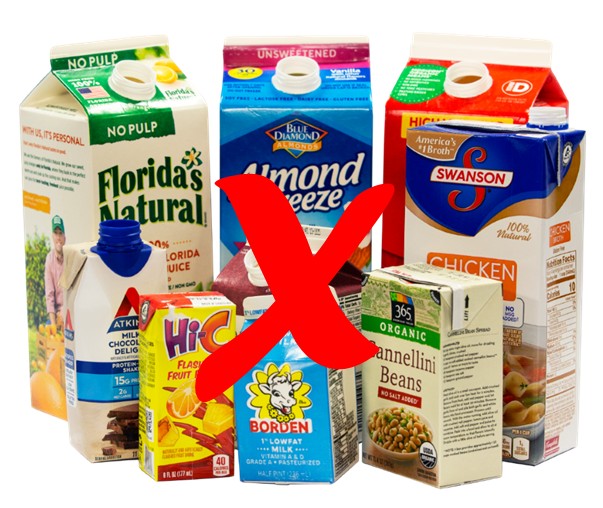 As the saying goes, there's no use crying over spilled milk. However, in this case, it's the carton that has met its end, not the milk. Food and beverage cartons are no longer accepted in the curbside recycling programs of Gainesville and Alachua County. Cartons are also no longer accepted for recycling drop-off at any of the Alachua County Rural Collection Centers.
As the saying goes, there's no use crying over spilled milk. However, in this case, it's the carton that has met its end, not the milk. Food and beverage cartons are no longer accepted in the curbside recycling programs of Gainesville and Alachua County. Cartons are also no longer accepted for recycling drop-off at any of the Alachua County Rural Collection Centers.
Attempts to find domestic markets capable of processing this material have been unsuccessful. Additionally, the volume of cartons collected locally has been insufficient to fill shipments before the containers become moldy, rendering them unsuitable for recycling.
The following are no longer accepted for recycling:
- Gable-top containers, such as milk, juice & egg substitute cartons
- Tetra Pak (shelf-stable) containers, such as protein drinks, broth and boxed wine
- Juice boxes
For information on what materials are accepted for recycling, visit gainesvillefl.gov/WhatCanBeRecycled, and follow @ZeroWasteGNV on Facebook and Instagram.
The Magic of the Zero Waste Wizard
 Don’t know what to do with all your extra empty potion jars, broken staffs, and dusty witches’ hats lying around? Simply, visit gainesvillefl.gov/WasteWizard and ask your friendly Zero Waste Wizard to concoct a spell of responsible waste disposal!
Don’t know what to do with all your extra empty potion jars, broken staffs, and dusty witches’ hats lying around? Simply, visit gainesvillefl.gov/WasteWizard and ask your friendly Zero Waste Wizard to concoct a spell of responsible waste disposal!
The Zero Waste Wizard is the most reliable, up-to-date means for getting locally focused information on recycling, disposal, and reuse. City staff is constantly hitting the books at the School of Wizardry to keep the Zero Waste Wizard current, using information supplied mainly by app users like you.
In addition to answering crucial questions like “Is this recyclable?” a peek into the crystal ball will tell you everything from where to repair items, donate household goods, or find local scrap metal professionals.
While we think the Waste Wizard possesses all the answers, this Sorcerer of Sorting is also humble, so if you ask a question that doesn’t yet have an answer, you can suggest the addition of new items to the database of zero waste knowledge.
When you want to vanquish the dreaded foes of waste, clutter, and junk, the Zero Waste Wizard will cast a spell of all-knowing and all-seeing, giving you the answers you seek. In a world of darkness and uncertainty – “What do I do with all this old stuff?!” – let gainesvillefl.gov/WasteWizard light the way forward!